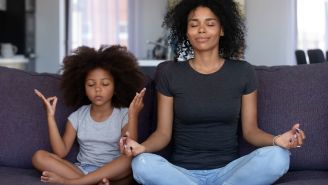Updated on July 1, 2025.
The holidays can be a lot to handle. There are often family gatherings to attend, presents to buy, end-of-year work deadlines to manage—and social media to show you just how poised and happy everyone else is with it all.
Elizabeth Block, MD, a psychiatrist at Saint Joseph Mercy Health System in Chelsea, Michigan, wants to help us understand why we often get so stressed this time of year and what we can do to calm anxiety and ruminating thoughts.
Read on for practical strategies to help you settle your nerves so you can enjoy the hustle and bustle.
Why winter wreaks havoc on our emotions
There are several reasons you might notice changes in your mood during the winter months. The first, and perhaps the most obvious, is the weather.
“As it gets colder and darker, we tend to skip activities that are healthy for us,” says Dr. Block. “It’s harder to get outdoors and engage in physical activity, which ordinarily can help improve our moods and reduce stress.”
Along similar lines, up to 3 percent of people will experience a more severe condition known as seasonal affective disorder (SAD). It’s a form of depression that usually comes about in fall and winter and subsides by spring. Symptoms such as low energy levels, overeating, sleep trouble, agitation, difficulty concentrating, and loss of interest in activities are usually a result of shorter days and decreased sunlight. People who have major depressive disorder or bipolar disorder are more susceptible to SAD.
Never-ending to-do lists and packed schedules can also contribute to stress and anxiety during the holiday season. A 2021 poll conducted by the American Psychiatric Association involving over 2,000 adults showed that 46 percent worried about affording holiday gifts, and mothers are more likely to experience increased stress levels than fathers.
“There are all kinds of expectations with regard to our families, socializing with friends, plus work,” says Block. “All of these pressures can be overwhelming.”
The expenses associated with the holiday season—including travel and gift-buying—can also place strain on your wallet and your mind, leading to more anxiety, especially if money is already tight.
What’s more, because of the record-high use of social media, it seems like everything we do these days is under a spotlight, and it might not be good for us. A 2020 review of research published in International Review of Psychiatry examined 42 studies conducted between 2011 and 2019. It found that adolescent depression and suicidal behavior significantly increased during the period examined, which coincides with the rise of smartphones and social media.
The review noted that 97 percent of adolescents between 13 and 17 years old use at least one social media platform, leading to the suspected correlation between social media use and increased depression. Findings consistently pointed to a link between comparing oneself to others on social media and elevated levels of depression. More research is needed to confirm such links.
Social media usage increased even further during the COVID-19 pandemic, according to a 2022 Spanish study published in the International Journal of Environmental Research and Public Health. Worldwide users grew from 3.8 billion to over 4.5 billion in less than two years, largely due to lockdowns and social distancing. People turned to social media for support and connection. While many users found virtual connection beneficial, many adults reported feeling less happy after spending more time on social media, according to a study published in 2021 in Frontiers in Psychology.
For some, viewing Instagram and Facebook feeds full of holiday cards, party photos, expensive gifts, and lavish vacations may be uplifting and inspirational. But for others, these could trigger feelings of comparison, envy, loneliness, and depression.
Whether it’s social media, a tight budget, or just too much of everything that may be getting to you during the winter season, Block offers these suggestions for easing the strain.
Take a look at the past
When gearing up for the winter season, it may help to recall how things have gone in the past. “Looking back and doing an inventory about things that were challenging or stressful during last holiday season can be really helpful,” says Block. “Once you identify the stressors you’ve experienced before, you can plan for them in case they crop up again.”
That may mean making a careful to-do list well in advance of a dinner party you are hosting, game-planning how you’re going to navigate an awkward work relationship at the office party, or starting to stash cash in a holiday savings account at the beginning of each year.
Put something on the schedule that’s for just you.
“It may sound cliché, but self-care is really important,” says Block. “In the midst of shorter days, longer checklists, and greater financial strains, taking time to care for yourself can calm your mind and may help you enjoy the holiday season that much more.”
Block suggests signing up for new experiences that can help put some pep in your step. She enjoys experimenting with different exercise classes, trying out new recipes, and incorporating new foods into her diet. Find something you’ve always wanted to try, block off time in your calendar, and make sure it actually happens.
Stumped for novelties to try? There’s no shame in sticking to the basics. Simply getting outdoors for a brisk, half-hour walk—whether during your lunch break at the office or before the kids come home from school—can do wonders for your mindset and overall health. The Sharecare app (available for iOS and Android) tracks your steps to help you maintain the habits.
Power down
It’s tough to do, but disconnecting from social media—even for a little bit—can not only help minimize thoughts of comparison but also free up real-life time for the ones you love.
When you do find yourself going down an Instagram rabbit hole, it can be useful to remember that most people’s feeds are merely highlights of their lives, sometimes filled with fake smiles and photo editing, rather than documentaries of what’s really going on behind the scenes.
“Try turning off your phone and keeping it out of sight when spending time with family,” says Block. “It can help you stay present at get-togethers. Powering down your devices an hour or more before bedtime may also help you sleep better.” What to do with the time you’ve earned back? Consider starting a gratitude journal or trying mindfulness meditation instead.
Don’t feel bad about saying ‘no’
It can be tempting to volunteer to join your church’s holiday giving committee, work at your child’s school holiday party, and bring your favorite dishes to your office or neighborhood potluck. The reality is that doing it all may not be possible or even advisable.
“If you’re feeling overextended or stressed, it’s okay to set a limit,” says Block. “Pick the few commitments that are most important to you and make those a priority. If you’re hosting a party, try delegating tasks so you’re not responsible for everything.”
Another tip? If you have last-minute shopping to do, don’t be a hero and brave the malls. Try online shopping instead, where you can put your feet up, cozy up by the fire, and sip on a warm mug of tea.







